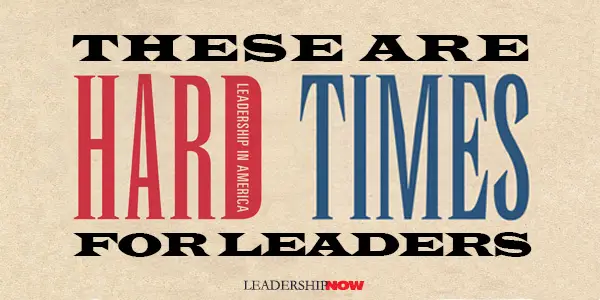 |
 |
11.24.14

These Are Hard Times for Leaders BARBARA KELLERMAN has written about leaders (good and bad) and followers, but in Hard Times she turns her attention to the often-overlooked context in which we lead. Leaders, followers, and context, form a system of leadership.
BARBARA KELLERMAN has written about leaders (good and bad) and followers, but in Hard Times she turns her attention to the often-overlooked context in which we lead. Leaders, followers, and context, form a system of leadership.
“More than ever,” writes Kellerman, “it is better—better in practice and better in theory—to focus less on the leader and more on the leadership system.” It is difficult to navigate or change systems without understanding the underlying context they exist in. We diminish our capacity to lead when we don’t consider all aspects of leadership. Hard Times is about context. It’s not about looking in but looking out. Everywhere leaders are finding it difficult to lead without using or threatening to use force because everywhere followers are making their lives difficult—and because everywhere context is both a cause and an effect of this power dynamic. So this book is about what leaders need to know to develop contextual expertise. Her extensive examination considers twenty-four different ways the context in which we lead shapes leadership now—in the United States—in the second decade of the twenty-first century. However, much of what she discusses is global because it is human. Tackling America’s historical background, she writes, “When the history of a country leaves a legacy that renders its citizens virtually allergic to authority, leadership is more difficult.” The capacity to persuade is more important than the capacity to control.
Other contextual issues like money as influence, the anxiety of innovation, the competitive need to be first, class distinctions, cultural pressures, divisiveness, special interest groups, environmental issues, and risk management, have all intensified. These all serve to undermine leadership confidence and put us off-balance. Risk management is not something that we generally like to spend our time thinking about. And unfortunately, some risk management platitudes only serve to put us asleep—only to wake up when a real risk comes along and we are ill-prepared to deal with it. We need to develop “risk management based not on what we know, or think we know, but on what we do not know.” Leaders and followers have changed in profound ways too. In general, says Kellerman, all this adds up to the fact that leaders are getting weaker. Leaders may not have less influence but they do have less power. Titles mean less and “status means less, which means that their ability to lead has lessened as well.”As Kellerman, Moisés Naím and others have argued, power is “undergoing a historic and world-changing transformation. Big players are increasingly being challenged by newer and smaller ones, and those who have power are more constrained in the way they can use it.” While I think this has always been and will continue to be an underlying truth on a micro level, we may very well see a backlash on this trend at the macro level. Time will tell. The most obvious reason leaders have been enfeebled are first, changes in culture that entitled and embolden subordinates to demean and diminish their putative superiors, and second, changes in technology that enable ordinary people to obtain information, engage in self-expression, and make interpersonal connections in ways and to degrees that historically are unprecedented. Increasingly, unable to rely on power and authority, on a more general level leaders are having to become what true leadership is about: influence. Exercising influence is what leaders should have been doing (and should have been trained to do) instead of relying on position and power because they could get away with it. Leaders “are more dependent than they ever were on their capacity to exercise influence.” As leaders we need to keep focused not just on the leader and the followers but on the context in which they interact. “Leading has become a high-wire act that only the most skilled are able to perform successfully over a protracted period of time.”
Kellerman’s insight at the end of the book is worth repeating because it says so much: “Leadership is not a profession.” Amen. 
Posted by Michael McKinney at 09:15 AM
|
BUILD YOUR KNOWLEDGE
 

How to Do Your Start-Up Right STRAIGHT TALK FOR START-UPS 
Grow Your Leadership Skills NEW AND UPCOMING LEADERSHIP BOOKS 
Leadership Minute BITE-SIZE CONCEPTS YOU CAN CHEW ON 
Classic Leadership Books BOOKS TO READ BEFORE YOU LEAD |